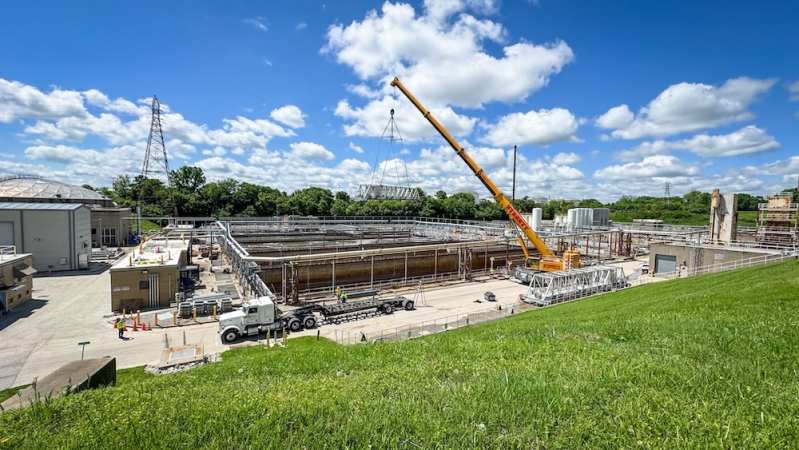
The Louisville MSD Board has approved a preliminary rate proposal for fiscal year 2026 to support major infrastructure investments that protect public health, property and the environment across its service area. Under the budget plan, MSD will invest more than $302 million to support 181 capitalimprovement projects.
The rate proposal adds $3.91 to the average monthly Jefferson County residential bill and $1.57 to the average monthly Oldham County* residential bill, starting August 1, 2025.
“The health and safety of our community depends on infrastructure that’s often out of sight, but its importance is undeniable when it’s put to the test,” said MSD Executive Director Tony Parrott. “Over the past year we have met with community members, legislators, and other elected officials on the significant needs of MSD and affordability concerns. While we never like to raise rates, the flooding events we experienced this year underscored the need for systems that are resilient, reliable and ready. This budget will allow us to continue strengthening that infrastructure while also ensuring we continue to meet our federal environmental requirements for clean water.” Supporting essential services and infrastructure MSD’s investments will support three utility services under one organization: wastewater treatment, stormwater management, and flood protection for the 800,000 people MSD serves. Over 90% of the capital budget goes to work required to meet federal and state environmental standards. This includes ongoing projects to significantly reduce sewer overflows that pollute local waterways during periods of heavy rain. Other work focuses on upgrading or replacing critical infrastructure and facilities that are decades, even a century old in the case of some underground sewer lines and are in urgent need of repair or replacement. Key capital projects include:
- Paddy’s Run Flood Pumping Station: This vital facility protects more than 216,000 people and $34 billion in property. The budget plan invests $70.2 million in fiscal year 2026 toward a total $230 million replacement that will double pumping capacity. Completion is expected in spring 2027.
- Morris Forman Water Quality Treatment Center: Kentucky’s largest wastewater treatment facility, in operation since 1958, and now serving two-thirds of Louisville residents, is being modernized to sustainably produce Class A biosolids, meet stricter clean water regulations and create renewable energy. MSD is investing $83.5 million this budget year toward the total $285 million project. Completion is expected in 2028.
- Odor Control Improvements: As part of the $49 million clAIRity initiative, MSD is replacing hundreds of outdated catch basins in several neighborhoods – each costing between $15,000 and $20,000 – and installing new odor control systems at treatment and pump stations over the next five years.
Keeping rates as low as possible while protecting public health and safety MSD’s rate-setting process includes oversight from its citizen board. The 4.9% proposed rate increase, for Jefferson County customers, remains within the increase threshold allowed by Louisville Metro ordinance.
“We understand that any increase to household bills raises concerns, and we take that seriously,” said MSD Board Chair Ricky Mason. “MSD engineers have done extensive work to plan the needs and resources to protect the community and this proposed budget goes to great lengths to smartly finance the work, leverage alternative funding sources and keep rates as low as possible. This budget will allow MSD to continue to protect the people and places we serve, and make our systems stronger, more reliable and better prepared for the future.”
MSD actively pursues federal and state grants, low-interest loans, and innovative financing mechanisms to reduce overall project costs. For instance, the $230 million replacement of Paddy’s Run Flood Pumping Station is supported by a $74 million Kentucky Infrastructure Authority low-interest loan, a $6.2 million forgivable loan through the Clean Water State Revolving Fund, and $14 million in Cleaner Water grants.
The budget is also supported by a $150 million bond issue recently approved by the Louisville Metro Council. Only 6 cents of every rate dollar goes toward administrative expenses. The rest funds the operation, maintenance, and improvement of essential infrastructure. Wastewater rates in Louisville remain competitive with regional peer cities, as they are currently lower than Cincinnati, Nashville and Atlanta. Budget proposal extends MSD rate-assistance programs MSD continues to provide financial assistance for customers who need help paying their bills.
Programs include:
- Drops of Kindness: partnership with Louisville Water to fund rate assistance programs through community nonprofits like the Association of Community Ministries.
- Emergency Wastewater Rate Assistance Program (EWRAP): offering a 30% wastewater discount to qualifying households
- Senior Citizen Discount: also offering a 30% wastewater discount for eligible seniors MSD has provided more than 10,000 customers rate assistance. To learn more or apply, visit LouisvilleMSD.org/PayMyBill or call 502.540.6000. To learn more or review the full budget proposal, visit LouisvilleMSD.org/Rates. Public comments may be submitted during the 30-day comment period by emailing Finance@LouisvilleMSD.org.
Editor’s Note:
*Why is the Oldham County rate increase so different from Jefferson County?” MSD is operating under a previously approved rate schedule set forth by the Oldham County Fiscal Court when it managed wastewater services in the county, prior to MSD’s taking on Oldham County wastewater management in 2020. Oldham County rates are currently higher than Jefferson County, and that long-term rate schedule will eventually equalize with that of Jefferson County.


